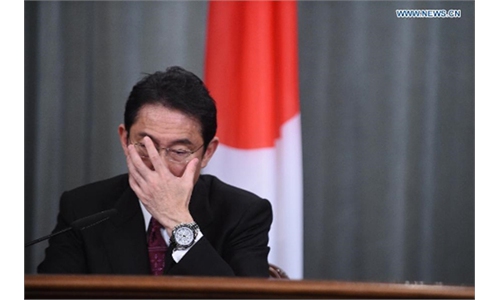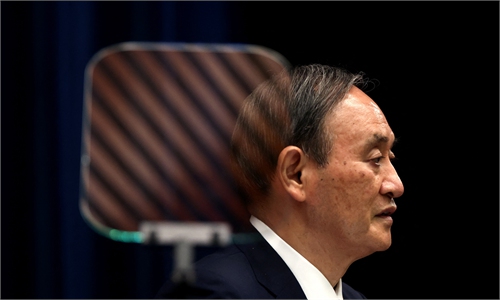
Yasuhide Nakayama (R), Japan's State Minister of Defense, meets with United States Army's Gen. Paul Miki Nakasone, the Commander of United States Cyber Command, Fort Meade in Maryland, on August 9, 2021. Photo: AFP
Japanese Deputy Defense Minister Yasuhide Nakayama on Wednesday likened the geographic and cultural proximity between the island of Taiwan and Japan to his "nose and mouth," and thus Japan would treat Taiwan's peace and security as its "own business." This is the most radical and explicit remarks on Taiwan made by a senior Japanese official recently.
Japanese officials used to avoid mentioning Taiwan, especially from a security perspective. Now, they repeatedly talk about Taiwan and the words and tone they use are more provocative. This is a very prominent and deliberate adjustment. At first, they only emphasized that Japan is concerned about the "peace and security" in the Taiwan Straits. Then, they implicitly talk about the sensitive issue of how Japan would react if the Chinese mainland uses force against Taiwan. Now, Japanese deputy defense minister has gone to the extent of regarding Taiwan's peace and stability as "Japan's own business."
But Japanese senior officials still dare not say that Japan will participate in the war in that situation, nor has the US ever made such a declaration. It seems that they have deliberately formed a strategic ambiguity toward the Taiwan question to align with the US cross-Straits policy. Once such a trend of Japan is formed, it will constitute a serious challenge to China's core national interests
A very strong anti-China ideology has been formed in Japan. Japanese radical politicians have led the aggressive sentiment toward China. They are in turn driven by the sentiment, drifting further in the tide of a competition of being tough toward China. Such a competition of sentiment is different from the "anti-Japan" wave among ordinary Chinese people. Such a performance of Japan is more likely to trigger real consequences and incidents, leading to a further chain reaction in China-Japan relations.
For example, the Liberal Democratic Party (LDP) of Japan and Taiwan's Democratic Progressive Party (DPP) held their first "2+2" security meeting on August 27, and Japan may have new political stunt on worshipping at the Yasukuni Shrine which cannot be accepted by China and South Korea. As long as there is a chance, Japan will turn to the salami-slicing tactics and highly uncertain how far it will go. The upcoming presidential election of the LDP has almost turned into a "carnival" of tough performances against China. This wicked neighbor who has repeatedly invaded China in modern times is frantically clamoring a "threat from China."
Due to the Japanese politicians' clamor of worry and resentment, those who are not familiar with East Asian history would think that China took the initiative to attack Japan in WWII. They would believe that Japan's land must have been taken away by China in history since it is so much smaller than that of China.
The Chinese and Japanese public hold negative sentiment toward each other. According to a survey conducted by Beijing-Tokyo Forum at the end of last year, 52.9 percent of Chinese held a negative impression of Japan while about 90 percent of Japanese had an unfavorable impression of China. There is no reason for Japanese to have more hatred toward China than the Chinese people do with Japan. Their hatred toward China is morally dirty.
Japan has been caught up in the worst geopolitical environment since the Meiji Restoration. China, which once was far behind Japan, has seen a rise. China's GDP now is three times that of Japan. Russia was defeated by Japan in the early 20th century, but it seized the Kuril Islands after WWII, and could arrogantly view Japan now. South Korea is smaller than Japan and once Japan's colony. But it has grown to be a developed country and a challenger to Japan in the technological sector. Japan, on the other hand, has seen no progress, but a continuous decline.
Japan follows the US in confronting China, and regards the US military occupation, which is supposed to be a shame, as the source of security and strategic competitiveness. It seems Japan doesn't have a correct understanding of its strength. It acts like a fox assuming the majesty of the tiger, but is not confident.
Japan cannot strategically confront China by itself, and does not have the ability to make the Taiwan question "Japan's business." Whatever they say on the Taiwan question, their goal is to win support from the US, just like the DPP authorities in Taiwan island did.
China will have to face Japan, a country in decline, for a long time. At the same time, we must bear clearly in mind that Japan is no longer the biggest obstacle to China's rejuvenation, nor is it the top threat to China's national security. We are facing such a Japan: It is a US ally who constantly seeks global attention in the changing times while willfully provoking China. How to properly deal with it has become a long-term subject for China.


